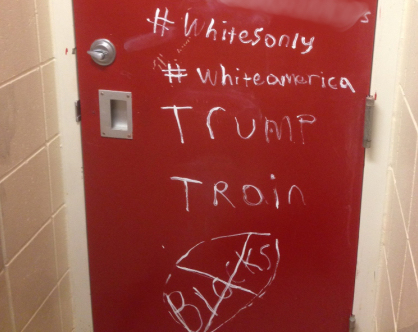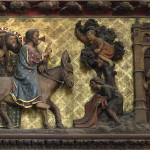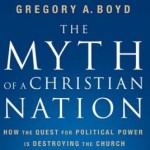We run our website the way we wished the whole internet worked: we provide high quality original content with no ads. We are funded solely by your direct support. Please consider supporting this project.

Responding to the Negative Fallout of Trump’s Election
Yesterday I suggested that we refrain from judging the motivations of brothers and sisters who voted for Donald Trump (see post). As the young lady I spoke with illustrates, a person could genuinely grieve over the negative implications Trump’s Presidency might have for certain people groups but nevertheless believe that there are considerations that outweigh these negative implications – the overturning of Roe verses Wade being a case in point. But whether or not you believe there were reasons for voting for Trump that outweighed these negative implications, the fact remains that his status as President elect is already having this effect.
To give just a few anecdotal illustrations, I have several Middle Eastern acquaintances that, over the last few days, have had white people shout at them to “go home.” I have heard from several parents whose non-white children were told by certain classmates that they were going to be deported now that Trump is president. Several days ago I learned of a conservative Muslim American couple that decided it was no longer safe for their daughter to wear a hijab. Along the same lines, the day after the election, a high school here in the Twin Cities found racist graffiti (a sample is pictured above) written in several locations. And I have read that some women, especially women who have experienced sexual assaults in their past, are suffering high levels of anxiety just knowing that a man who bragged about sexually assaulting women will soon become the most powerful person on the planet, sending the message that this kind of behavior is no big deal.
In an article published since the election, *Jonathan Martin similarly reflected:
After getting done with our Election Day communion service Tuesday night, I walked over to a sushi restaurant in downtown Tulsa for a bite. Things had just started to really turn in the election coverage. The guys who work in the kitchen, all from Mexico, were terrified. They said that if Trump won, they were so nervous about what it could mean for them that they would not show up for work the next morning.
Last week I sat across the table from a black pastor friend of mine, who leads a church he founded in rural Salisbury, NC. He was telling me harrowing stories he and his congregation have been experiencing on the ground, with a sudden surge in activity from white supremacists groups in their area, who openly cite the Trump campaign.
My best friend’s daughter, a 4th grader, went to her school yesterday in Cleveland, TN, where her classmates started loudly chanting “Build that wall! Build that wall! Build that wall!” to a Latino classmate.
A young woman who attends a church founded by one of my mentors was told by one of her students yesterday, “Donald Trump won. Get the f#@^ out of our country!”
It is simply undeniable that America has, literally over night, become a less welcoming if not openly threatening place to many people who are not white males. Whether this continues to be true will depend, in large part, on what the future leader of our country says and does while in office. One can only hope and pray that he will address situations like the ones I’ve mentioned. But whether or not this continues, there are right now multitudes of people who are living in fear and who are feeling unwelcomed by, and betrayed by, a country they love and identify with. And whether or not you were among those who felt there was a greater good that outweighed the possibility that Trump’s presidency might have this negative effect on minorities and women, it is incumbent on all of us who are not directly impacted to enter into solidarity with all who are.
I encourage us to earnestly pray for all who are currently feeling vulnerable in light of this election. And while we of course cannot control the actions of anyone else, including the actions of our soon-to-be-president, I encourage us to go out of our way to communicate to these individuals that we share their pain and that we will put ourselves on the line to love and serve them. Let’s commit to being a people who love all others the way Christ has loved us, giving his life for us when we were in need (Eph 5:1-2).
*I highly recommend that you take some time to read the full text of Jonathan’s reflections here. It’s lengthy, but thought-provoking, beautifully written, and deeply convicting.
Photo credit: CBS Minnesota
Category: General
Tags: Kingdom Living, Love Your Neighbor, Politics, Racism, Sexism, Xenophobia
Topics: Ethical, Cultural and Political Issues
Related Reading

On Hacking Off Our Own Limbs
Nadia Bolz Weber posted this weekend on The Sarcastic Lutheran, and we thought you’d enjoy her thoughts on hacking off our own limbs for Jesus. Don’t worry, you won’t have the urge to find an axe after you read this. Or at least not a real axe. From the post: And here’s the thing…that story? The…

Lighten Up: Experience Informs
If you don’t think the world is filled with injustice, it might be because you’re at the top of the food chain.

Palm Sunday, Partisan Politics & the Power of the Cross
Today we’re sharing something from David D. Flowers that we found especially insightful as we approach holy week. We hope it blesses you and moves you to more fully manifest the kingdom that is not of this world. ~~~ We remember it in the church as Palm Sunday. This is the triumphal entry of Jesus into…

“The kingdom of God…advances only by exercising power under others. It expands by manifesting the power of self-sacrificial, Calvary-like love.” [Quotes]
“While all the versions of the kingdom of the world acquire and exercise power over others, the kingdom of God, incarnated and modeled in the person of Jesus Christ, advances only by exercising power under others. It expands by manifesting the power of self-sacrificial, Calvary-like love.”

Did Jesus Instruct Us to Arm Ourselves?
Over the past few posts, I’ve been dealing with the passages that are frequently used to argue how Jesus condoned violence. One of these takes place just after the last supper and just before Jesus and his disciples were going to travel to the Mount of Olives to pray. To prepare his disciples, Jesus tells them;…

Living With a Kingdom Consciousness
What Is the Kingdom of God? I want to begin by asking, “What is the kingdom of God?” This may seem like a rather obvious question. We all know what the Kingdom of God is, right? But see, this is precisely the problem. It’s why (I shall argue) the Kingdom of God is largely absent…
